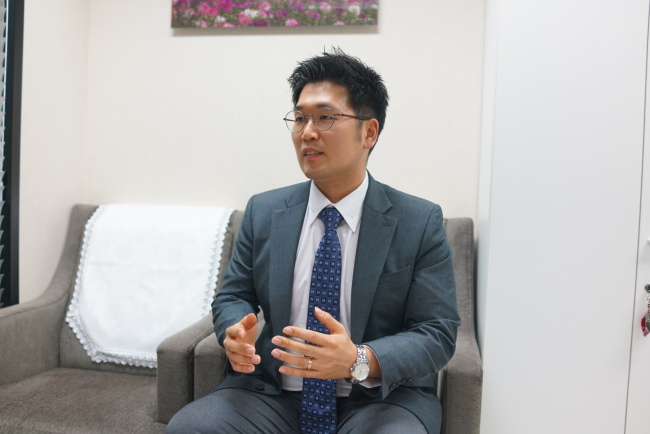[Herald Interview] The price of faith for conscientious objectors
Jehovah’s Witness lawyer sent to jail, suspended from practice for refusing to enlist in Army
By Bak Se-hwanPublished : Dec. 5, 2017 - 08:32
Born to a family of Jehovah’s Witnesses, Baek Jong-keon realized the price of his faith in South Korea at an early age.
His father had gone to jail for refusing to take up arms, and his three older brothers chose the same path when the time came for them to serve their mandatory military service.
His father had gone to jail for refusing to take up arms, and his three older brothers chose the same path when the time came for them to serve their mandatory military service.

In a country where all able-bodied men are required to serve in the military to defend against North Korea’s 1.2 million-strong armed forces, it seemed like a bleak future awaited him, too.
“I grew up watching my father -- and my three brothers -- go to jail for objecting to the mandatory military service. It was hard to overcome the fear and the pain as a kid,” said Baek, 33, in an interview with The Korea Herald.
“That’s why I wanted to become a lawyer -- to change the situation.”
Baek also chose the life of a conscientious objector in South Korea -- or the life of a convicted “draft dodger.” He was sentenced to 18 months in jail by the Supreme Court in 2016.
He served his prison term and was released in May this year. The Korean Bar Association suspended his lawyer’s license for five years, a possibility that he had known since he was preparing for the bar exam.
All this, however, does not mean Baek is accepting things as they are. Now working as an assistant at a small law firm, he is fighting to regain his license. He has been rejected once, but is still fighting.
He is also fighting for the sake of other conscientious objectors to have the government and society recognize their freedom of conscience and offer them alternative ways to serve the country.
“Roughly 400 young conscientious objectors are currently in jail. I think that we should seriously consider giving them alternative forms of military service instead of just treating them as outlaws,” he said.
Since 2013, nearly 2,500 people were prosecuted for failing to enlist in the military, according to data from the Military Manpower Administration. The military service law mandates a prison sentence of up to three years for men who avoid the draft.
A majority of the 2,500 are Jehovah’s Witnesses, who object to any form of militarism. Of the total, 15 are unreligious, objecting conscription based on their personal beliefs and the principles of “no violence” and “no war.”
But there are growing signs that the judicial system may be easing its stance on conscientious objectors. This year alone, 40 acquittals were made at lower courts for conscientious objectors, five times more than in 2016, reflecting a possible change in legal perceptions.
Although no final decision by the Supreme Court to uphold the acquittals has been made yet, the repeated rulings in favor of the objectors are pressing the government to react.
The Constitutional Court is currently reviewing the constitutionality of the conscription law, with several complaints filed regarding conscientious objection.
During his confirmation hearing at the National Assembly last month, new Constitutional Court chief Lee Jin-sung hinted at the need to change the long-entrenched judicial practice against conscientious objection.
“We should take the situation seriously where people endure being sent to prison for their adherence to their conscience,” Lee said.
Views on conscientious objection seem to be changing as well.
According to a survey by the National Human Rights Commission, 46.1 percent of people said last year the government should allow conscientious objection, up 12.8 percentage points from 33.3 percent in a 2011 poll.
“The answer is simple,” Baek said. “We just have to adopt legislation that allows conscientious objectors to carry out an appropriate alternative service of a length comparable to that of military service.”
Three bills are pending at the National Assembly seeking to add alternative options to the mandatory military service system.
Critics argue it is premature to adopt an alternative service program, especially amid ongoing threats from North Korea. It would also affect the morale of conscripted soldiers to see those citing faith -- which is hard to prove -- being allowed to avoid the tough life in barracks.
“We do not ask for special treatment,” Baek said.
“Some people wrongly assume that we would be exempted from the national duty mandated to all male citizens of South Korea once the court rules in favor of conscientious objection.
“But we are willing to serve our country once an alternative service for objectors is introduced. That will allow us to contribute to the community in a way that does not conflict with our conscience, for instance, in the areas of public health, social welfare, the environment and labor,” Baek added.
He also believes that religious conscientious objectors have an important role to play.
“It is our part not to give up and to keep hope alive. I hope they do not resign themselves to be sent to jail, but keep appealing against the prison term to bring about change,” Baek said.
By Bak Se-hwan (sh@heraldcorp.com)







![[Graphic News] More Koreans say they plan long-distance trips this year](http://res.heraldm.com/phpwas/restmb_idxmake.php?idx=644&simg=/content/image/2024/04/17/20240417050828_0.gif&u=)
![[KH Explains] Hyundai's full hybrid edge to pay off amid slow transition to pure EVs](http://res.heraldm.com/phpwas/restmb_idxmake.php?idx=644&simg=/content/image/2024/04/18/20240418050645_0.jpg&u=20240419100350)





![[From the Scene] Monks, Buddhists hail return of remains of Buddhas](http://res.heraldm.com/phpwas/restmb_idxmake.php?idx=652&simg=/content/image/2024/04/19/20240419050617_0.jpg&u=20240419175937)

![[KH Explains] Hyundai's full hybrid edge to pay off amid slow transition to pure EVs](http://res.heraldm.com/phpwas/restmb_idxmake.php?idx=652&simg=/content/image/2024/04/18/20240418050645_0.jpg&u=20240419100350)

![[Today’s K-pop] Illit drops debut single remix](http://res.heraldm.com/phpwas/restmb_idxmake.php?idx=642&simg=/content/image/2024/04/19/20240419050612_0.jpg&u=)